Module 2 Public holidays Unit 1 My family always go somewhere interesting as soon as the holiday be
文档属性
| 名称 | Module 2 Public holidays Unit 1 My family always go somewhere interesting as soon as the holiday be | 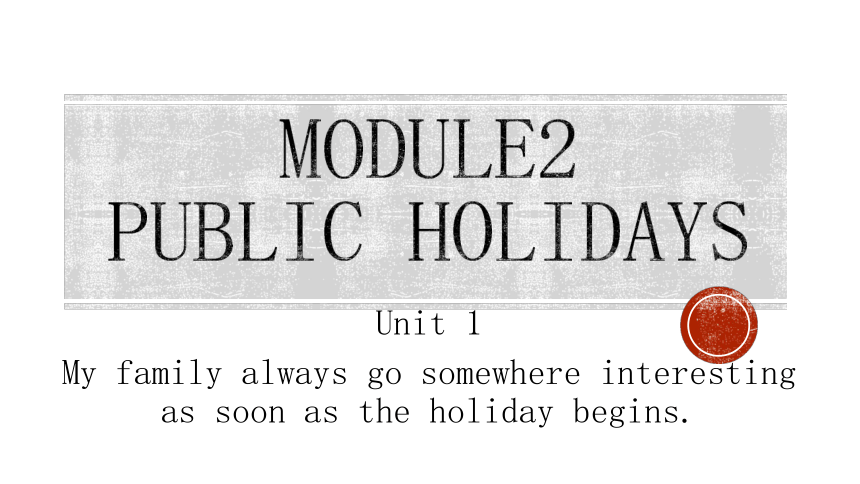 | |
| 格式 | zip | ||
| 文件大小 | 3.5MB | ||
| 资源类型 | 教案 | ||
| 版本资源 | 外研版 | ||
| 科目 | 英语 | ||
| 更新时间 | 2018-09-11 13:42:53 | ||
图片预览


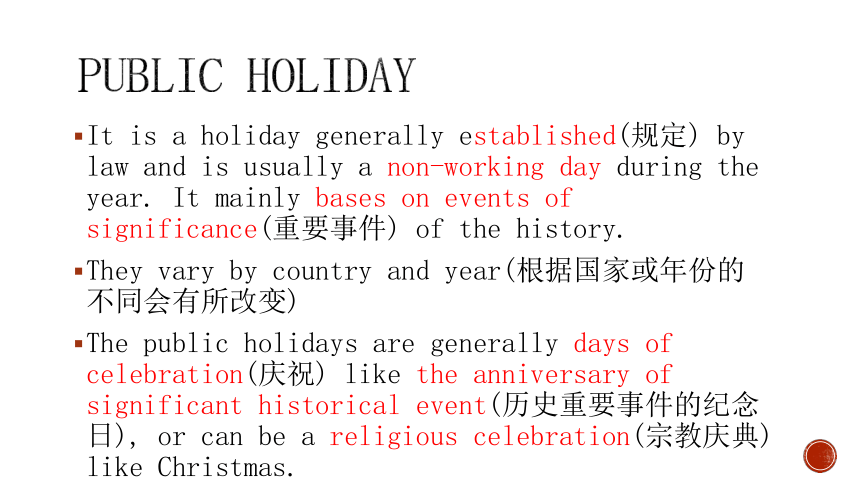
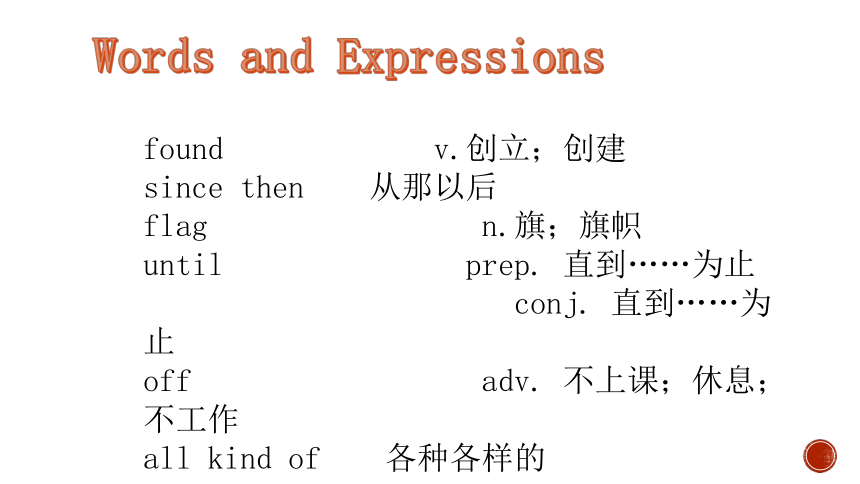
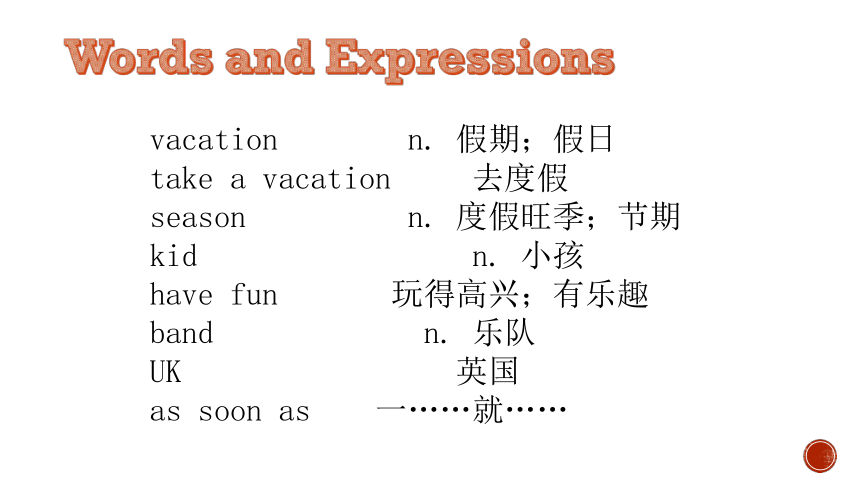
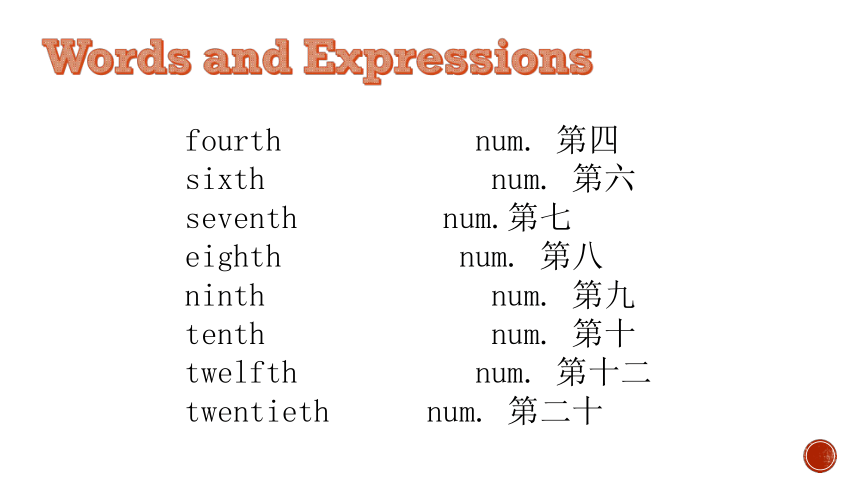
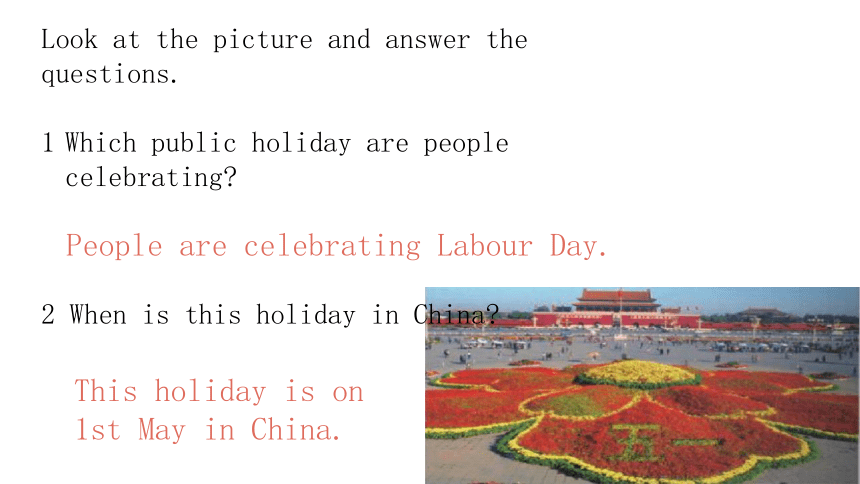
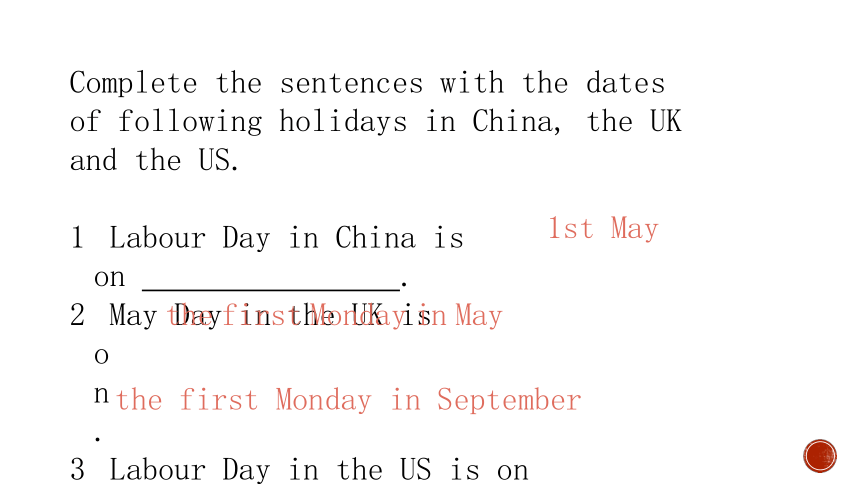
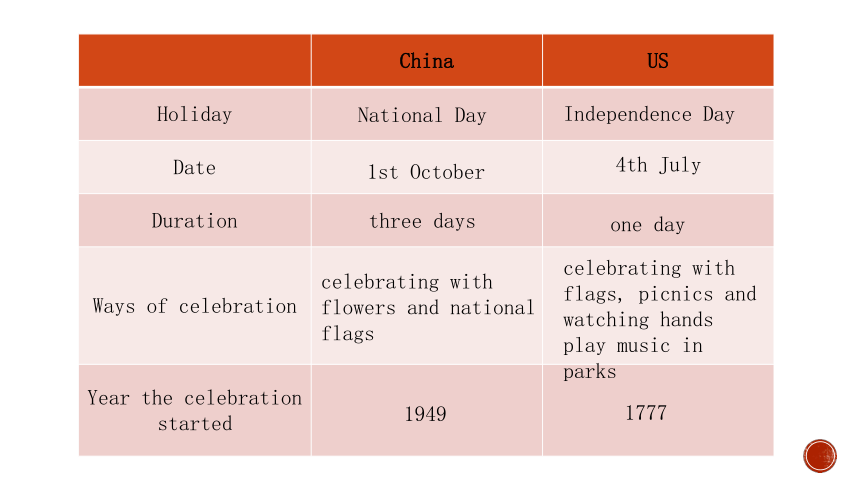
文档简介
课件28张PPT。Module2 public holidaysUnit 1
My family always go somewhere interesting as soon as the holiday begins.Public holidaysPublic HolidayIt is a holiday generally established(规定) by law and is usually a non-working day during the year. It mainly bases on events of significance(重要事件) of the history.
They vary by country and year(根据国家或年份的不同会有所改变)
The public holidays are generally days of celebration(庆祝) like the anniversary of significant historical event(历史重要事件的纪念日), or can be a religious celebration(宗教庆典) like Christmas.Words and Expressionsfound v.创立;创建
since then 从那以后
flag n.旗;旗帜
until prep. 直到……为止
conj. 直到……为止
off adv. 不上课;休息;不工作
all kind of 各种各样的 vacation n. 假期;假日
take a vacation 去度假
season n. 度假旺季;节期
kid n. 小孩
have fun 玩得高兴;有乐趣
band n. 乐队
UK 英国
as soon as 一……就……
fourth num. 第四
sixth num. 第六
seventh num.第七
eighth num. 第八
ninth num. 第九
tenth num. 第十
twelfth num. 第十二
twentieth num. 第二十Look at the picture and answer the questions.
Which public holiday are people celebrating?
2 When is this holiday in China?
People are celebrating Labour Day.This holiday is on 1st May in China.Complete the sentences with the dates of following holidays in China, the UK and the US.
Labour Day in China is on .
May Day in the UK is on .
Labour Day in the US is onthe first Monday in September1st Maythe first Monday in MayNational Day1st Octoberthree dayscelebrating with flowers and national flags1949Independence Day4th Julyone daycelebrating with flags, picnics and watching hands play music in parks1777National Day 国庆节
Spring Festival 春节
Lantern Festival 元宵节
Mid-Autumn Festival 中秋节
Tomb-Sweeping Festival 清明节
Chinese Valentine’s Day 七夕节
Dragon Boat Festival 端午节
Double Ninth Festival 重阳节St Valentine’s Day 情人节
Easter Day 复活节
Mother’s Day 母亲节
Father’s Day父亲节
Halloween 万圣节
Thanksgiving Day 感恩节English expressions of festivals 反义疑问句:表示说话人提出看法、建议或意见,问对方同意与否。结构:有两部分组成,前一部分为陈述形式,后一部分为疑问句。
e.g. The first of October is China’s National Day, isn’t it?
形式:前肯后否与前否后肯。
e.g. Lucy isn't beautiful, is she?露西不漂亮,是吗?
回答:肯定回答:“Yes+肯定结构”,否定回答“No+否定结构”,但是注意“Yes”要译为“不”,“No”要译为“是”。
e.g. -Your sister is a teacher, isn't she?你妹妹是老师,不是吗?
-Yes, she is. 不,她是老师。
-You can play the guitar, can't you?你会弹吉他,不是吗?
-No, I can't. 是的,我不会。
反义疑问句的类型(1)含be(is, are, was, were)动词的反意疑问句
句型1: 主语+ be+其它,isn’t(aren’t, wasn’t, weren’t)+ 主语?
句型2: 主语+ be not+其它,is(are, was, were) + 主语?
e.g. The weather is fine, isn't it?天气很好,不是吗?
The dress isn't blue, is it? 那件裙子不是蓝色的,是吗?
(2)助动词(do, did, done)的反意疑问句
句型1: 主语+do/did/have done+其它,don’t/didn’t/haven’t I(you, we, they)?
句型2: 主语+ don’t/didn’t/haven’t done+其它,do/did/have I(you, we, they)?
句型3: 主语+动词第三人称单数+其它,doesn’t/didn’t/hasn’t he(she, it)?
句型4: 主语+ doesn’t/didn’t/hasn’t+其它,does/did/has he(she, it)?
e.g. He said he wanted to visit Japan, didn't he?
(3) 情态动词
句型1: 主语+情态动词+动词原形+其它,情态动词否定形式+主语? 句型2: 主语+情态动词否定形式+动词原形+其它,情态动词+主语? e.g. You must go home now, needn’t you? Yes, I must. /No, I needn’t.
有时英语的谓语动词并不用否定式(即没加上not),而是用上了“never, little, few, hardly, nothing, nobody”等词,这时该陈述句也属于否定句,因此,反意疑问句的后半部分应用肯定疑问式.
e.g. You have never been to Beijing, have you?
Yes, I have. No, I haven’t.1. They have to study a lot, ______?
a. don’t they b. haven’t they
c. did they d. hadn’t they
2. When the car crashed, your brother escaped being hurt, ______ ?
a. didn’t he b. did he
c. did it d. didn’t it
3. I'm sure dirty, ______?
a. am I b. isn’t
c. aren’t I d. am not IAAC反意疑问句中,提问部分如果是am 的否定式,用aren‘t I(英式),或 ain‘t I(美式)was founded on
found v.创立;创建
be founded on 被建立在……
found sth. (on sth.)
find—found—found
The town in 1610.
该城镇兴建于1610年.was foundedon 1st October 1949Date:日/月/年
月/日/年
基数词变序数词的规则on,at,in1. 时间点、节假日前用at
at 7:30, at Christmas
2. 表示一个时间段用in
in May, in spring, in the morning
3.时间单位≥2以及星期前用on,表示具体的某一天
on May 1在5月1号,其中5月是一个月份,1号是日,这儿就存在两个时间单位,因此用介词on。
on Friday morning星期五Friday是一个时间,早上morning也是一个时间,两个时间单位,所以也用“on”
on Monday—SundayPeople have celebrated the National Day since then.
Adverbial clauses of time时间状语从句:用从句来表达一件事情或一个行为发生的时间
since引导的时间状语从句,表示“自从……”
常与现在完成时连用
e.g. He has studied very hard since he came to our school.
自从来到我们学校,他学习就非常努力。
I have known Bill since he was born.
从比尔出生起,我就认识他。We have a three-day holiday.
“基数词+名词”可构成复合形容词,在句中作定语。其中,词与词之间用连字符连接,名词用单数形式until引导的时间状语从句
until表示动作或状态持续到某一时刻,即“直到……”
e.g. He waited until all the guests left.
他一直等到所有客人都走了。
He will wait until you finish all the work.
我会等到你完成所有工作。
时态:从句用一般现在时,主句是一般将来时,;从句用一般过去时,主句仍用过去将来时,We’ll stay there until the end of the holiday.
我们会在那儿一直呆到假期结束。
此句中until后接的不是时间状语从句 ,而只是时间状语
相当于从句until the holiday is overwhile引导的时间状语从句
表示主句的行为在从句行为进行的过程中发生
while 从句的侧重点在于描述动作正在发生的状态,它的意思是:当while 事件正在发生的时候,另一件事如何如何。由于while从句表示一个持续的行为,所以,从句中要用持续性动词或状态动词,且持续性动词常用进行时态。而另一件事的状态没有硬性的要求,根据具体情况而定。
e.g. While my wife was reading the newspaper, I was watching TV.
当妻子正在看报纸的时候,我正在看电视。
While they were talking , the bell rang.
正在他们谈话的时候,上课铃响了。…but we only have a one-day off.
off为副词,意为“不上课/班;休息”
我明天休息。
I’m off tomorrow.
I’m taking a week off over Christmas.
圣诞节期间我会休假一星期。We usually have a picnic somewhere nice.
用形容词修饰不定代词或不定副词的时候,形容词要放在不定代词和不定副词的后面,如anything special, somewhere interesting.
不定代词:something, someone, somebody, anything, anyone, anybody, nothing, nobody, no one, everything, everyone, everybody
不定副词:somewhere, anywhere, nowhere, everywhereAnd my family always go somewhere interesting as soon as the holiday begins.
假期一开始,我全家就会去某个好玩的地方。
as soon as表示“一……就……”,强调动作紧密相连
We began to work as soon as we got there.
I will tell him the news as soon as he comes back.
My family always go somewhere interesting as soon as the holiday begins.Public holidaysPublic HolidayIt is a holiday generally established(规定) by law and is usually a non-working day during the year. It mainly bases on events of significance(重要事件) of the history.
They vary by country and year(根据国家或年份的不同会有所改变)
The public holidays are generally days of celebration(庆祝) like the anniversary of significant historical event(历史重要事件的纪念日), or can be a religious celebration(宗教庆典) like Christmas.Words and Expressionsfound v.创立;创建
since then 从那以后
flag n.旗;旗帜
until prep. 直到……为止
conj. 直到……为止
off adv. 不上课;休息;不工作
all kind of 各种各样的 vacation n. 假期;假日
take a vacation 去度假
season n. 度假旺季;节期
kid n. 小孩
have fun 玩得高兴;有乐趣
band n. 乐队
UK 英国
as soon as 一……就……
fourth num. 第四
sixth num. 第六
seventh num.第七
eighth num. 第八
ninth num. 第九
tenth num. 第十
twelfth num. 第十二
twentieth num. 第二十Look at the picture and answer the questions.
Which public holiday are people celebrating?
2 When is this holiday in China?
People are celebrating Labour Day.This holiday is on 1st May in China.Complete the sentences with the dates of following holidays in China, the UK and the US.
Labour Day in China is on .
May Day in the UK is on .
Labour Day in the US is onthe first Monday in September1st Maythe first Monday in MayNational Day1st Octoberthree dayscelebrating with flowers and national flags1949Independence Day4th Julyone daycelebrating with flags, picnics and watching hands play music in parks1777National Day 国庆节
Spring Festival 春节
Lantern Festival 元宵节
Mid-Autumn Festival 中秋节
Tomb-Sweeping Festival 清明节
Chinese Valentine’s Day 七夕节
Dragon Boat Festival 端午节
Double Ninth Festival 重阳节St Valentine’s Day 情人节
Easter Day 复活节
Mother’s Day 母亲节
Father’s Day父亲节
Halloween 万圣节
Thanksgiving Day 感恩节English expressions of festivals 反义疑问句:表示说话人提出看法、建议或意见,问对方同意与否。结构:有两部分组成,前一部分为陈述形式,后一部分为疑问句。
e.g. The first of October is China’s National Day, isn’t it?
形式:前肯后否与前否后肯。
e.g. Lucy isn't beautiful, is she?露西不漂亮,是吗?
回答:肯定回答:“Yes+肯定结构”,否定回答“No+否定结构”,但是注意“Yes”要译为“不”,“No”要译为“是”。
e.g. -Your sister is a teacher, isn't she?你妹妹是老师,不是吗?
-Yes, she is. 不,她是老师。
-You can play the guitar, can't you?你会弹吉他,不是吗?
-No, I can't. 是的,我不会。
反义疑问句的类型(1)含be(is, are, was, were)动词的反意疑问句
句型1: 主语+ be+其它,isn’t(aren’t, wasn’t, weren’t)+ 主语?
句型2: 主语+ be not+其它,is(are, was, were) + 主语?
e.g. The weather is fine, isn't it?天气很好,不是吗?
The dress isn't blue, is it? 那件裙子不是蓝色的,是吗?
(2)助动词(do, did, done)的反意疑问句
句型1: 主语+do/did/have done+其它,don’t/didn’t/haven’t I(you, we, they)?
句型2: 主语+ don’t/didn’t/haven’t done+其它,do/did/have I(you, we, they)?
句型3: 主语+动词第三人称单数+其它,doesn’t/didn’t/hasn’t he(she, it)?
句型4: 主语+ doesn’t/didn’t/hasn’t+其它,does/did/has he(she, it)?
e.g. He said he wanted to visit Japan, didn't he?
(3) 情态动词
句型1: 主语+情态动词+动词原形+其它,情态动词否定形式+主语? 句型2: 主语+情态动词否定形式+动词原形+其它,情态动词+主语? e.g. You must go home now, needn’t you? Yes, I must. /No, I needn’t.
有时英语的谓语动词并不用否定式(即没加上not),而是用上了“never, little, few, hardly, nothing, nobody”等词,这时该陈述句也属于否定句,因此,反意疑问句的后半部分应用肯定疑问式.
e.g. You have never been to Beijing, have you?
Yes, I have. No, I haven’t.1. They have to study a lot, ______?
a. don’t they b. haven’t they
c. did they d. hadn’t they
2. When the car crashed, your brother escaped being hurt, ______ ?
a. didn’t he b. did he
c. did it d. didn’t it
3. I'm sure dirty, ______?
a. am I b. isn’t
c. aren’t I d. am not IAAC反意疑问句中,提问部分如果是am 的否定式,用aren‘t I(英式),或 ain‘t I(美式)was founded on
found v.创立;创建
be founded on 被建立在……
found sth. (on sth.)
find—found—found
The town in 1610.
该城镇兴建于1610年.was foundedon 1st October 1949Date:日/月/年
月/日/年
基数词变序数词的规则on,at,in1. 时间点、节假日前用at
at 7:30, at Christmas
2. 表示一个时间段用in
in May, in spring, in the morning
3.时间单位≥2以及星期前用on,表示具体的某一天
on May 1在5月1号,其中5月是一个月份,1号是日,这儿就存在两个时间单位,因此用介词on。
on Friday morning星期五Friday是一个时间,早上morning也是一个时间,两个时间单位,所以也用“on”
on Monday—SundayPeople have celebrated the National Day since then.
Adverbial clauses of time时间状语从句:用从句来表达一件事情或一个行为发生的时间
since引导的时间状语从句,表示“自从……”
常与现在完成时连用
e.g. He has studied very hard since he came to our school.
自从来到我们学校,他学习就非常努力。
I have known Bill since he was born.
从比尔出生起,我就认识他。We have a three-day holiday.
“基数词+名词”可构成复合形容词,在句中作定语。其中,词与词之间用连字符连接,名词用单数形式until引导的时间状语从句
until表示动作或状态持续到某一时刻,即“直到……”
e.g. He waited until all the guests left.
他一直等到所有客人都走了。
He will wait until you finish all the work.
我会等到你完成所有工作。
时态:从句用一般现在时,主句是一般将来时,;从句用一般过去时,主句仍用过去将来时,We’ll stay there until the end of the holiday.
我们会在那儿一直呆到假期结束。
此句中until后接的不是时间状语从句 ,而只是时间状语
相当于从句until the holiday is overwhile引导的时间状语从句
表示主句的行为在从句行为进行的过程中发生
while 从句的侧重点在于描述动作正在发生的状态,它的意思是:当while 事件正在发生的时候,另一件事如何如何。由于while从句表示一个持续的行为,所以,从句中要用持续性动词或状态动词,且持续性动词常用进行时态。而另一件事的状态没有硬性的要求,根据具体情况而定。
e.g. While my wife was reading the newspaper, I was watching TV.
当妻子正在看报纸的时候,我正在看电视。
While they were talking , the bell rang.
正在他们谈话的时候,上课铃响了。…but we only have a one-day off.
off为副词,意为“不上课/班;休息”
我明天休息。
I’m off tomorrow.
I’m taking a week off over Christmas.
圣诞节期间我会休假一星期。We usually have a picnic somewhere nice.
用形容词修饰不定代词或不定副词的时候,形容词要放在不定代词和不定副词的后面,如anything special, somewhere interesting.
不定代词:something, someone, somebody, anything, anyone, anybody, nothing, nobody, no one, everything, everyone, everybody
不定副词:somewhere, anywhere, nowhere, everywhereAnd my family always go somewhere interesting as soon as the holiday begins.
假期一开始,我全家就会去某个好玩的地方。
as soon as表示“一……就……”,强调动作紧密相连
We began to work as soon as we got there.
I will tell him the news as soon as he comes back.
同课章节目录
- Module 1 Wonders of the world
- Unit 1 It's more than 2,000 years old.
- Unit 2 The Grand Canyon was not just big.
- Unit 3 Language in use
- Module 2 Public holidays
- Unit 1 My family always go somewhere interesting a
- Unit 2 We have celebrated the festival since the f
- Unit 3 Language in use
- Module 3 Heroes
- Unit 1 She trained hard,so she became a great play
- Unit 2There were few doctors, so he had to work ve
- Unit 3 Language in use
- Module 4 Home alone
- Unit 1 I can look after myself, although it won’t
- Unit 2 I became so bored with their orders that I
- Unit 3 Language in use
- Module 5 Museums
- Unit 1 Don't cross that rope!
- Unit 2 If you ever go to London, make sure you vis
- Unit 3 Language in use
- Module 6 Problems
- Unit 1 If I start after dinner, I'll finish it be
- Unit 2 If you tell him the truth now, you will sho
- Unit 3 Language in use
- Revision Module A
- Module 7 Great books
- Unit 1 We're still influenced by Confucius's idea
- Unit 2 It is still read and loved.
- Unit 3 Language in use
- Module 8 Sports life
- Unit 1 Daming wasn't chosen for the team last time
- Unit 2 He was invited to competitions around the w
- Unit 3 Language in use
- Module 9 Great inventions
- Unit 1 Will computers be used more than books in t
- Unit 2 Will books be replaced by the Internet?
- Unit 3 Language in use
- Module 10 Australia
- Unit 1 I have some photos that I took in Australia
- Unit 2 The game that they like most is Australian
- Unit 3 Language in use
- Module 11 Photos
- Unit 1 He's the boy who won the photo competition
- Unit 2 The photo which we liked best was taken by
- Unit 3 Language in use
- Module 12 Save our world
- Unit 1 If everyone starts to do something, the wor
- Unit 2 Repeat these three words daily: reduce, reu
- Unit 3 Language in use
- Revision Module B
